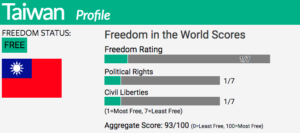Taiwan’s voters delivered a stinging rebuke of China’s rising authoritarianism on Saturday by re-electing President Tsai Ing-wen, who vowed to preserve the island’s sovereignty in the face of Beijing’s intensifying efforts to bring it under its control, The New York Times reports.
Taiwan’s vibrant democratic practices are a stark contrast to Beijing’s ruthless one-party rule and oppression, says Stanley Kao, the head of the Taipei Economic and Cultural Representative Office in the United States. This explains why the CCP has been intensifying its efforts to meddle in Taiwan’s political process through diplomatic suppression, disinformation, infiltration and economic coercion, he writes for The Washington Post:
 Freedom House’s annual report in 2019 gave Taiwan high marks as one of the freest countries in the world — at a time when there has been an alarming global decline in political rights and civil liberties over the past decade or so. The island republic’s legalization of same-sex marriage, the first in Asia, was chosen by The Post as one of 19 good things that happened in 2019. It proves that human rights and freedom of speech are not just “Western” values.
Freedom House’s annual report in 2019 gave Taiwan high marks as one of the freest countries in the world — at a time when there has been an alarming global decline in political rights and civil liberties over the past decade or so. The island republic’s legalization of same-sex marriage, the first in Asia, was chosen by The Post as one of 19 good things that happened in 2019. It proves that human rights and freedom of speech are not just “Western” values.
The emphatic rebuke of China’s authoritarian influence in what some observers billed as the most consequential election of 2020 drew disdain in Beijing, prompting some in Taiwan to brace for greater coercive measures from the Communist Party., The Wall Street Journal adds (HT:FDD).
There were multiple complaints from Tsai Ing-wen’s campaign about Beijing’s intrusions, pressure and disinformation campaigns during the electoral race, TIME adds, prompting Taiwan’s Foreign Ministry Joseph Wu to comment: “If China likes playing with the democracies of other countries so much, perhaps at some point it could try holding its own elections.”
 Tsai Ing-wen met with de facto envoys from Japan and the United States to affirm ties after her landslide victory in Saturday’s election, while China’s foreign ministry urged) the international community to adhere to the One China principle and oppose Taiwan’s independence, the Council on Foreign Relations reports:
Tsai Ing-wen met with de facto envoys from Japan and the United States to affirm ties after her landslide victory in Saturday’s election, while China’s foreign ministry urged) the international community to adhere to the One China principle and oppose Taiwan’s independence, the Council on Foreign Relations reports:
Tsai’s reelection campaign promised to defend Taiwan’s sovereignty and democracy, and she received the highest number of votes since Taiwan began direct presidential elections in 1996, winning with a 57.1 percent (FT) majority. Her Democratic Progressive Party also maintained control of Taiwan’s legislature. Beijing’s Taiwan Affairs Office said it would continue to pursue a “one country, two systems” strategy for Taiwan’s reunification with China, a proposal that Taiwanese leaders have rejected for decades.

Tsai’s decisive victory offers several possible lessons, adds CFR analyst Joshua Kurlantzick:
- For one, she was a more effective candidate—disciplined, with coherent messages, and without major scandals, while Han struggled to explain his policies and got caught up in several scandals relatively late in the campaign.
- Taiwan’s economy has performed relatively well under Tsai, although it still faces major long-term challenges, and its performance boosted the incumbent, especially since Han did not have a clear economic plan or team. Han’s tough-talking, off-the-cuff, and sometimes abrasive style may have worked in getting him more attention in the earlier stages of the campaign, but comments by him and other KMT officials that seemed sexist could have hurt the KMT among voters.
-
But the biggest lesson from the election comes from how the candidates used China, always the biggest issue in a Taiwan election campaign—and how China’s behavior, including its attempts to sway the election, may actually have helped Tsai win re-election
- The election result gives credence to suggestions that Taiwan can teach struggling countries about building a democracy.
- “Taiwan was an authoritarian country, and it made a remarkably interesting and important transition to democracy in the 1980s and the 1990s, and it continues,” Carl Gershman, president of the National Endowment for Democracy (NED), told the CNA news agency.
- His comments came after being awarded the Order of Brilliant Star with Grand Cordon from President Tsai Ing-wen (above) in recognition of his contribution to the consolidation of Taiwan-US relations, as well as advancing freedom and democracy around the world.
- The landslide reelection of Taiwan’s leader underscores the population’s embrace of an identity distinct from China — a shift that the communist leaders of China refuse to accept, Ken Moritsugu writes for the Associated Press (HT:FDD).







